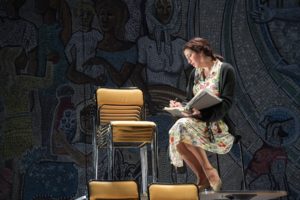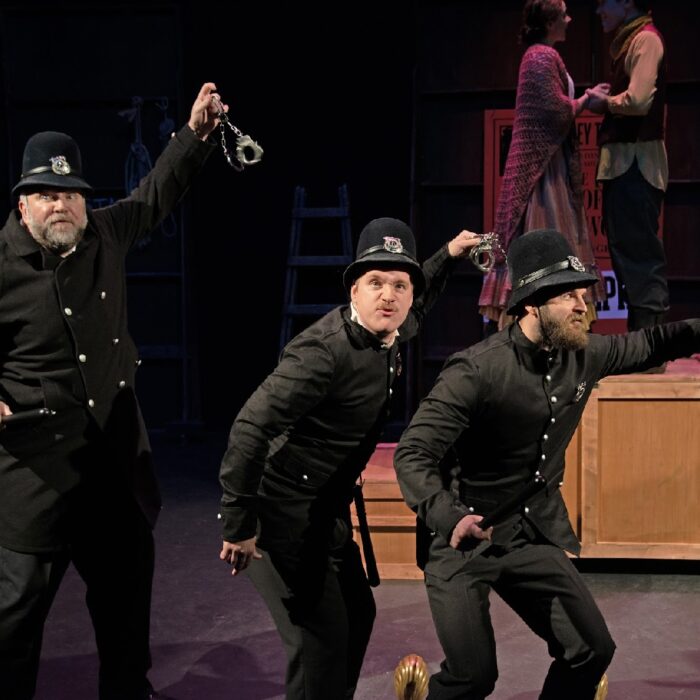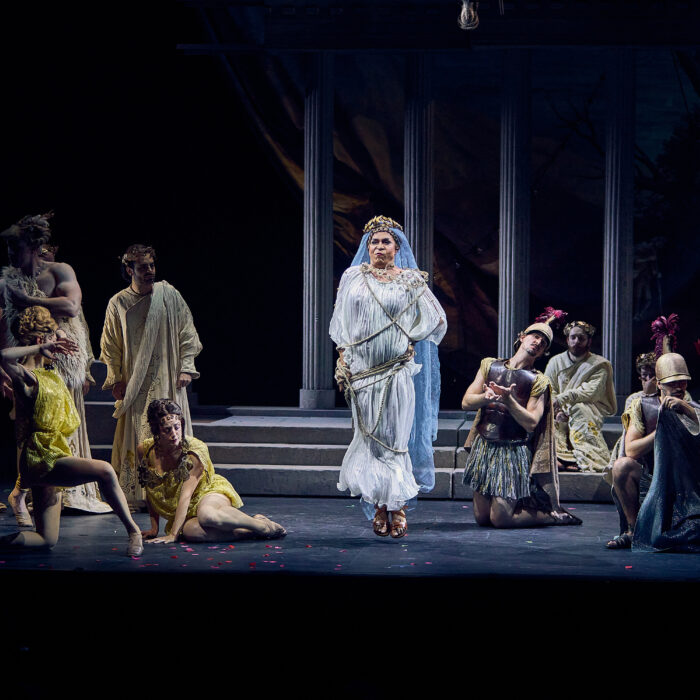
Oper Frankfurt 2017-18 Review – Eugene Onegin: A Touching and Clever Version of Tchaikovsky’s Gem
By Santosh Venkataraman“Eugene Onegin” by Tchaikovsky is based on the novel by the same name by the great Russian poet Alexander Pushkin, whose writings centered around the title character.
But what of the equally important perspective of Tatiana, the woman in love with Onegin before he shatters her dreams? In the production of “Onegin” performed by Oper Frankfurt seen Friday night, the work of another great Russian writer is a major visual aspect.
Her name is Anna Akhmatova, and her words are seen throughout the performance at the top of the cage-like structure that is the setting. In Cyrillic, they are “Гулять, целоваться, стареть,” and loosely translated as “to go, to kiss, to age.” The poem is seemingly about a relationship in which the woman has been disappointed in love. She seeks a partner to “to go, to kiss, to age” with, but ends by telling that partner not to tell me about love.
This is an apt description for how Tatiana ends up. She knows what love is from her experience with Onegin. Yet the relationship she ends up in with Prince Gremin is captured perfectly by Akhmatova’s poem.
It is a clever touch for a production that debuted a year ago, with director Dorothea Kirschbaum taking over after original director Jim Lucassen was unable to continue the project due to illness. Akhmatova’s words and the cage loom large in showing us a closed society.
Larinas in Factory
The Larinas live alongside a bread factory, with the workers kneading dough as they are introduced in the Act one chorus. The sisters sing of love, with soprano Maria Bochmanova in her role debut as Tatiana and mezzo-soprano Maria Pantiukhova as Olga. When Lenski and Onegin enter the room, it’s instantaneous to see the difference between the women. Olga leaps immediately into the arms of Lenski while Tatiana shyly stands about.
That entrance is notable for how the protagonist physically comes into the action, seemingly in a flash. Onegin, portrayed by baritone Daniel Schmutzhard, immediately showcases his cool indifference. He is clad in black with sunglasses that state his disdain for having to meet the Larinas or maybe even to be anywhere.
The scene in which Tatiana writes her fateful letter to Onegin is crafted ingeniously. She writes and dreams about him at the same time, sharing a kiss with Onegin on stage as part of the dream. It’s all part of the set-up for what will soon turn ugly, beginning with the arrogant rejection by Onegin.
Action in the Ballroom
The ballroom scene is quite lavish, given the peasant-like conditions of the factory before. Onegin is once again annoyed at having to visit and shamelessly dances with Olga. For her part, the flirtatious Olga is unaware of how jealous Lenski is getting. When Triquet enters and pays tribute to Tatiana, it ratchets up the anger between the two men and their subsequent duel is showcased using revolvers in the bar where the ballroom party was held.
The development of Schmutzhard’s Onegin was clear here as he openly wonders about how his friendship with Lenski has fallen by the wayside. Slowly but surely, the coolness of Onegin is evaporating foreshadowing his development by the end.
Much time has passed when Onegin returns and sees the much more mature and white-haired Tatiana. Prince Gremin’s tale to the visitor of how much he loves his wife only adds to the drama as Onegin’s misery is complete.
Musical mastery
Conductor Sebastian Weigle excels with Tchaikovsky’s music as it carries forth the drama. The music was beautifully played and showcased the greatness of one of Russia’s finest composers with Weigle’s Frankfurt Opera and Museum Orchestra.
Schmutzhard has performed his Onegin in many places and he succeeds at delivering an incremental demise of the title character. In the end, Onegin is disheveled and a shell of himself. Schmutzhard solidly blends his body language with his singing chops.
Bochmanova sang expressively throughout, and her girlish dress as a young Tatiana belied a womanly nature. That’s why it was no surprise how well she performed as the mature Tatiana, Gremin’s wife.
Among the other characters, bass Nikolay Didenko was outstanding in his Act three aria as Gremin in his Frankfurt debut. Young Russian tenor Arseny Yakovlev has been singing Lenski for some time and it showed with his melodic, easy voice. Pantiukhova’s Olga enjoyed some wonderful interplay with Tatiana.
Whether or not the concept of the cage and the bread factory completely work is beside the point. This is a “Eugene Onegin” that brings across the idea that it is not just one character who has emerged heartbroken but two.


